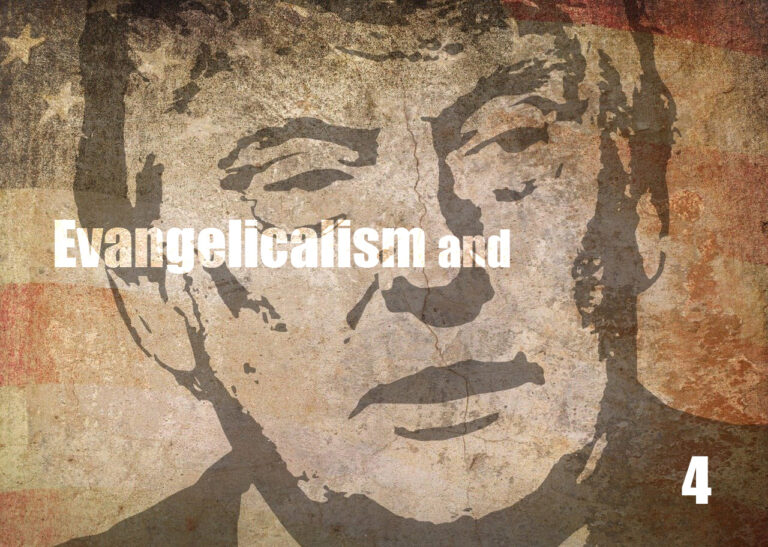“Like most theocratic movements, the resurgent religious right is more interested in power than moral righteousness. Their new god, Donald Trump, has the audacity to depict himself as a Christian martyr. His followers revel in blatant idolatry as they also paint him as a Jesus-like figure. As a huckster, he offers them what he promises is the deal of a lifetime: capture of the federal courts, which will allow them to impose their agenda in exchange for the price of their moral compasses. A casual observer might say this looks a lot like selling their souls. Pro-Trump evangelicals seem to believe that America simply must be a Christian nation – even if getting there means making deals with the devil.”*1
In his excellent BBC documentary series Things Fell Apart, Jon Ronson looks for the origin stories he believes lie behind the culture wars we see playing out all around us today. The first episode features Francis Schaeffer, an art historian and founder of the L’Abri movement, whose passion was to call Christians to engage creatively with art and popular culture.
American evangelical Christians were largely uninterested in the topic of abortion, until Schaeffer featured the Roe v Wade case in the final two episodes of the film series How We Then Shall Live? and his son Frank forced his father to commission a follow-up series given entirely to the topics of abortion, euthanasia and infanticide. The story of Whatever Happened to the Human Race? and the levers that were pulled to force the topic onto the evangelical agenda is best told by Ronson.*2 Suffice it to say that it was Schaeffer’s firm belief that the United States was founded on a Christian base that motivated his passion for crusading on a topic that has become a defining issue for evangelical Christians today.
It is not difficult to understand the reasons why abortion has become a polarising issue. The decision whether or not a pregnancy can and should be terminated balances a right to life against a range of other factors. In order to understand why abortion is such a contentious issue in the United States we need to return again to the wording of the Declaration of Independence which states that humans are entitled to pursue “Life, Liberty and the pursuit of Happiness” and also asserts that these rights have been endowed by God and should be protected by the government.
The right to life is thus balanced against the liberty/freedom of a woman to choose what happens to her own body and the impact bringing up a child might have on her mental state. Which human right wins out is a matter of interpretation – which is why the composition of the Supreme Court has become such a hot potato. We all interpret according to our beliefs and preferences, and judges are no different to the rest of humanity.
Enter Donald Trump into this maelstrom. Whilst he is praised by many evangelicals for packing the Supreme Court with right-wing traditionalists who succeeded in overturning Roe v Wade, thus ending the federal right to abortion in the United States, he also railed against those Republican mid-term candidates whom he said made too much of the “abortion issue” and then then lost to their Democrat opponents. When he criticised Gov. Ron DeSantis, then campaigning against him as the Republican nominee for the presidential race, for signing strict abortion curbs into law in Florida none of the charges of hypocrisy stuck. “Now his supporters believe themselves,” remarked Karen Swallow Prior, an evangelical Christian author and literary scholar. “Despite the fact that Trump clearly wavers on abortion and he wavers on LGBTQ issues, those things are just ignored, they’re just erased out of the narrative.”*3
It is one thing to have a settled opinion on the question of abortion, which I have, and another thing entirely to insist that my view must be imposed on everyone. In fact, I will go further than this: there is no single moral issue that should be allowed to define a Christian because following Jesus is not a moral crusade. The Pharisees were noted for thinking and behaving like Trump-supporting evangelicals and Jesus opposed them at every turn. Not, apparently, because he disagreed with their moral opinions but because they were misrepresenting the nature of God’s rule.
It would be wrong to suggest that Jesus held no moral opinions, but on thorny issues such as abortion Jesus was mostly silent. There are those who argue that this is either because he was opposed to them and thus nothing more needed to be said, or that they weren’t major concerns in his day. Neither response is logical or true. He doesn’t refer to homosexuality or abortion, yet both were certainly known and discussed during his era. It would be wrong, however, to draw any specific conclusions from things he did not say. Let us consider instead the occasion on which Jesus is presented with a woman caught in the act of adultery and responds most pointedly with a condemnation of her accusers’ hypocrisy. Remember too his recurring insistence that judgmentalism keeps us from God.
The judgmentalism of Christians also keeps many I know of from thinking about Jesus. And that offends me greatly.
*1 See https://www.newstatesman.com/comment/2024/06/evangelical-christians-donald-trump-pact
*2 Things Fell Apart https://www.bbc.co.uk/sounds/play/m0011cpq


